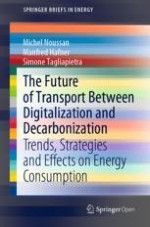Energy systems are rapidly transitioning towards decarbonization, thanks in part to innovative digital technologies and changing mobility demands. This open access book examines the decarbonization and digitalization transformation in the transport sector, with a particular focus on energy consumption. By studying historical trends and outlining future scenarios, the authors illustrate the evolution of energy consumption in the transport sector, compare alternative decarbonization strategies, and analyze digitalization trends and their effects on energy consumption. The book addresses a broad readership of both academics and professionals working in the energy and transport industries, as well as readers interested in the ongoing debate over energy, mobility and climate change.
